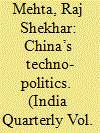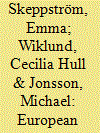| Srl | Item |
| 1 |
ID:
192935


|
|
|
|
|
| Summary/Abstract |
The impact of China’s Digital Silk Road (DSR) on countries signing the Belt and Road Initiative (BRI) is a less explored area. This article argues that the repercussions of unregulated propagation of DSR on BRI countries are likely to go beyond economy and commerce because of the vastly different approach of China’s use of technology in its own governance. Since this aspect is inadequately covered in existing literature, an attempt is made to fill the gap. When external entities are allowed to setup large-scale digital networks, e-governance and e-commerce in technologically deficient countries of the Global South, the host country loses control over its digital data that such networks generate. Overdependence on technology of one nation can lead to a data monopoly with a potential impact on the entire polity. To what extent this hypothesis holds substance is the issue deliberated on in this article using inductive reasoning and qualitative methods.
|
|
|
|
|
|
|
|
|
|
|
|
|
|
|
|
| 2 |
ID:
137423


|
|
|
|
|
| Summary/Abstract |
With European Union Training Missions (EUTM) Mali and EUTM Somalia, the EU seeks to stabilize countries facing state weakness caused by intrastate conflict. While the EU formally promotes security sector reform (SSR) through its foreign policy, the EUTM missions in Mali and Somalia in one sense can be described as “counter-insurgency by proxy” as military trainees combat local insurgencies shortly upon graduation. This raises the question whether the EUTM missions are consistent with SSR aims, such as creating a security sector that is legitimate, sustainable, and under civilian control, or inadvertently risk contributing to negative side effects in the medium term. Based on extensive interviews in Belgium, Kenya, Mali, Sweden, and Uganda with personnel who either served in or planned these missions, this study analyses factors which hinder the EUTM concept from being fully consistent with SSR and identifies possible policies to ameliorate the risk of unintended side effects.
|
|
|
|
|
|
|
|
|
|
|
|
|
|
|
|